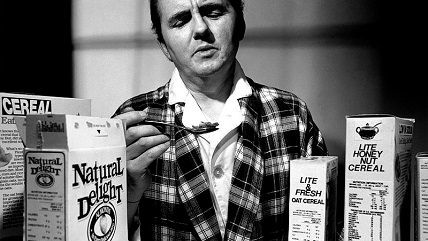The Feds 'Modernize' Food Safety Without Making Food Safer
Proposed FDA food-safety rules under the FSMA show the expensive campaign to modernize food safety shouldn't be confused with one that improves food safety.


Can the federal government spend hundreds of millions of dollars on food-safety regulations without making Americans or our food much safer? Sadly, the answer appears to be yes.
In late September, the Food and Drug Administration (FDA) released two key sets of revised rules intended to implement the Food Safety Modernization Act (FSMA), the federal food-safety law passed in 2011.
The FSMA, widely billed as the most important update of the nation's food-safety regulations in 75 years, is intended, as the FDA puts it, "to ensure the U.S. food supply is safe by shifting the focus from responding to contamination to preventing it."
Last year, though, two sets of rules the FDA proposed to adopt under the law created a firestorm. As I wrote (see here and here, for example), the proposed rules would have forced many small farmers and local food entrepreneurs to adopt onerous, expensive, and unnecessary farming practices and procedures. Among the barriers proposed under the rules were tough new regulations for using organic fertilizer, a ban on using spent grains to feed livestock, and a host of costly new regulations for growing tree fruits.
Many small farmers and their supporters argued in comments to the agency that the rules would erect costly new hurdles for them without ensuring a safer food supply for consumers.
"The FSMA has the real potential to make it impossible for small produce growers to make a living by requiring costly and we feel unnecessary alterations to the way produce is handled," wrote Pennsylvania small farmers Donald and Rebecca Kretschmann, who grow fruits and vegetables, in comments they submitted to the FDA.
Thousands of comments echoing those submitted by the Kretschmanns forced the FDA to pull back the proposed FSMA rules, effectively sending the agency back to the drawing board.
The result is, in part, what the FDA issued in late September—updated versions of two proposed rules that center on produce and good manufacturing practices. (The agency also issued two other revised rules I don't focus on here.)
Small farmers and other growing food entrepreneurs were right to criticize the agency's proposed rules for jeopardizing their livelihoods. But another little-noticed element of the proposed rules was that despite their intended effect, they wouldn't have made Americans or the food we eat much safer.
According to CDC data, there are 48 million cases of food-borne illness each year.
The earlier versions of the two proposed FSMA rules, as I wrote last year, would reduce that figure by, at best, only between 3.7 percent and 5.7 percent.
Now, according to FDA estimates released in September, the expected benefits of the proposed rules are even less apparent.
For example, the FDA says the newly revised produce rule will reduce up to 1.57 million cases of food-borne illness.
The revised proposed rules pertaining to manufacturing are even less promising.
"As in our original proposal," the agency writes, "we lack sufficient information to fully estimate the proposed rule's likely benefits…. We do not expect that all of these illnesses will be prevented; rather, we expect that the rule would prevent some portion from occurring. We estimate that there are close to 1,000,000 illnesses each year that are attributable to FDA-regulated food products that would fall under the scope of this proposed rule."
Taken together, the results are underwhelming. Even giving the FDA the maximum possible benefit of the doubt—even if I assume that the FDA will prevent every single one of the illnesses the agency itself doesn't expect to prevent—the maximum benefit of these FSMA rules would be a reduction of 5.4 percent of food-borne illnesses. Meanwhile, the agency also floats a break-even figure of reducing 228,000 cases of food-borne illness under the manufacturing rules. This would mean the two rules, taken together, would reduce cases of food-borne illness by up to 3.7 percent.
So the new range for FSMA "success" is a paltry reduction in cases of food-borne illness of between 3.7 percent and 5.4 percent.
And that's an optimistic view. I suspect even the lower figure isn't likely to be attained (at least not due to anything contained in the FSMA rules), given that the agency offers no floor on its estimate that the revised produce rule will reduce up to 1.57 million cases of food-borne illness. If the revised produce rule prevents 1 million cases instead of 1.57 million, for example, then we're looking at a lower end of a 2.6 percent overall reduction.
These revised proposed FSMA rules should make clear that the campaign to modernize food safety shouldn't be confused with one that improves food safety.
It's easy to see the disconnect between what Congress promised with the Food Safety Modernization Act and what the FDA is capable of delivering.
The American food supply is among the safest in the world. The FDA can take some credit for that. Effective regulations pertaining to fraud (particularly food mis-branding and adulteration) are already on the books.
But that's a small piece of the puzzle. The FDA can't wash the hands of every eater and cook in the country. What's more, the self-interest of people and of companies large and small means they provide us with food that's safe. When they don't, food-safety lawyers rightly sue them and we stop buying their products.
All this is not to say that the FSMA is entirely without merit. A few facets of the law actually make sense. Giving the FDA mandatory recall authority, as the law did, is an important tool for forcing foods that have been found to be a definitive hazard off the market. But these revised FSMA regulations will not make our food—or us—demonstrably safer. Instead, they'll most benefit the FDA, in the form of adding hundreds of millions of dollars to the agency's budget.
In hyping the FSMA, the FDA referred to food-borne illness as "a significant public health burden that is largely preventable." The former is true. The latter may be true. But it's also true that the proposed revised FSMA regulations have little to do with preventing food-borne illness.


Show Comments (22)